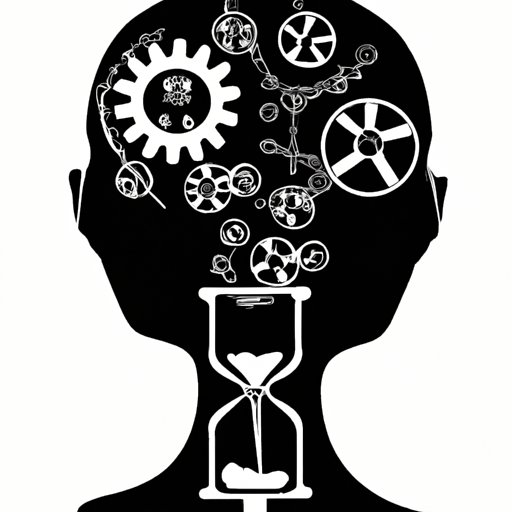
I. Introduction
Mental health is just as important as physical health, and taking care of one’s mental health is of the utmost importance. Sometimes, individuals may feel that they need more help than they can receive on their own, which is where the option of checking oneself into a mental hospital comes in.
Checking oneself into a mental hospital means that an individual willingly admits themselves into a facility to receive professional mental health care. This article explores what it means to check oneself into a mental hospital, the process of doing so, the benefits and drawbacks, and personal stories of individuals who have gone through this process.
II. Exploring the Process of Checking Yourself into a Mental Hospital and What to Expect
Checking oneself into a mental hospital can be a daunting process, but it is important to know what to expect in order to make it through the process smoothly. The first step is to find a mental hospital or mental health facility that can provide the care needed. Once an individual has found a facility, they will need to reach out and make contact with someone at the facility.
The next step is usually an initial consultation or evaluation. This can take place over the phone or in-person and will help determine the level of care needed and what kind of treatment plan will be put in place. After the evaluation, the individual will work with the facility to schedule a time for admission.
When checking oneself into a mental hospital, individuals should expect to undergo a series of tests to help determine the best course of treatment. This can include both physical and mental tests. Depending on the severity of the condition, the individual may need to stay in the hospital for an extended period of time to receive continuous care.
It is important to keep in mind that the process of checking oneself into a mental hospital can be different depending on the facility. It is always advisable to ask questions and seek clarification from the hospital staff to ensure that everyone is on the same page.
III. Discussing the Benefits and Drawbacks of Checking into a Mental Hospital for Yourself
Checking oneself into a mental hospital can have both benefits and drawbacks. It is important to consider both sides before making a decision.
Benefits of Checking Oneself into a Mental Hospital
One of the key benefits of checking oneself into a mental hospital is the round-the-clock care and support that will be provided. In a mental hospital, individuals will have access to highly trained professionals who specialize in mental health care. This can be incredibly beneficial for those who need immediate attention or are struggling to cope with their condition.
Another benefit of checking oneself into a mental hospital is the safe and controlled environment. The hospital environment eliminates many of the stressors and triggers that an individual may be facing in their daily life. This can help them focus on their healing and recovery.
Drawbacks of Checking Oneself into a Mental Hospital
One of the drawbacks of checking oneself into a mental hospital is the potential for stigma and judgment from others. Unfortunately, mental health still carries a stigma in some circles, which can lead to negative attitudes and assumptions about those who seek care in a mental hospital.
Another potential drawback is the cost and insurance coverage. Mental health treatment can be expensive, and not all insurance plans cover all forms of mental health care or treatments.
Comparison of the Benefits and Drawbacks of Checking Oneself into a Mental Hospital
When weighing the benefits and drawbacks of checking oneself into a mental hospital, it is important to consider personal needs and circumstances. Ultimately, the decision should be based on what will be most beneficial for the individual’s mental health journey.

IV. Personal Stories of Individuals Who Have Checked Themselves into a Mental Hospital and Their Experiences
Personal stories can be helpful in providing insight into what others have experienced when checking themselves into a mental hospital. These stories can also help lessen the fear and stigma associated with seeking mental health care.
One individual shared that they checked themselves into a mental hospital when they were struggling with suicidal thoughts after the death of a family member. The individual received the support and care needed to manage their grief and mental health condition. They shared that the mental hospital experience was tough, but they are grateful for the care they received.
Another individual shared that checking themselves into a mental hospital was a difficult decision, but it ultimately saved their life. Struggling with severe depression and suicidal thoughts, the individual received the care and support needed to manage their mental health condition and found hope for their future.
V. Highlighting the Resources Available to Individuals Interested in Checking Themselves into a Mental Hospital
There are many resources available for individuals who are interested in checking themselves into a mental hospital. Mental health professionals, crisis hotlines, and organizations such as the National Alliance on Mental Illness (NAMI) are available to provide support and guidance.
It is also important to research and find mental health facilities that can provide the appropriate level of care needed. Some hospitals may specialize in specific conditions, such as eating disorders or addiction, so it is important to find a facility that matches the individual’s needs.
VI. Exploring the Differences Between Voluntary and Involuntary Commitment to a Mental Hospital
There are two main types of commitment to a mental hospital: voluntary and involuntary. Understanding the differences can help inform a decision on which type of commitment is most appropriate.
Voluntary Commitment
Voluntary commitment means that an individual willingly admits themselves into a mental hospital for treatment. This type of commitment allows the individual to have control over their own care and treatment plan. They can leave the hospital at any time, unless there are concerns about their safety.
Involuntary Commitment
Involuntary commitment means that an individual is admitted into a mental hospital without their consent. This type of commitment is reserved for individuals who are a danger to themselves or others. Involuntary commitment is typically initiated by a mental health professional or law enforcement official and may require a court order.
Comparison and Contrast of Voluntary and Involuntary Commitment to a Mental Hospital
It is important to note that involuntary commitment should only be used when all other options have been exhausted. Voluntary commitment is generally preferred because it allows the individual to have control over their own care. However, there may be situations in which involuntary commitment is necessary to ensure the safety of the individual and those around them.
VII. Discussing the Importance of Seeking Professional Help Before Considering Checking Yourself into a Mental Hospital
Before making the decision to check oneself into a mental hospital, it is important to seek the advice and guidance of a mental health professional. A mental health professional can provide a thorough evaluation and recommend the appropriate level of care needed.
It is also important to have a support system in place, whether it is family, friends, or a mental health support group. Checking oneself into a mental hospital can be a difficult and emotional decision, and having support can make the process much easier.
VIII. Comparing and Contrasting the Experiences of Checking Yourself into a Mental Hospital versus Other Forms of Mental Health Treatment
Checking oneself into a mental hospital is just one form of mental health treatment. There are many other treatment options available, including therapy, medication, and support groups. Comparing and contrasting these options can help individuals make an informed decision about what will be most effective for their mental health needs.
Comparison of Checking Yourself into a Mental Hospital and Other Forms of Mental Health Treatment
One of the main differences between checking oneself into a mental hospital and other forms of treatment is the level of care and support provided. In a mental hospital, individuals have access to a team of highly trained professionals who can provide round-the-clock care and support. Other forms of treatment, such as therapy, may only be available for a few hours a week or month.
Differences Between the Different Forms of Treatment
Therapy is a common form of mental health treatment, and it can take many different forms, including cognitive-behavioral therapy (CBT), dialectical behavior therapy (DBT), and group therapy. Medication is also a common form of treatment, and it can help manage symptoms of depression, anxiety, and other mental health conditions. Support groups can provide a sense of community and support for individuals struggling with mental health issues.
Pros and Cons of Each Form of Treatment
The decision on which form of treatment to pursue should be based on personal needs and circumstances. It is important to weigh the pros and cons of each form of treatment and speak with a mental health professional to determine what will be most effective in managing symptoms and promoting overall mental wellness.
IX. Conclusion
Mental health care is an important aspect of overall wellness. Checking oneself into a mental hospital can be a difficult decision, but it can be incredibly beneficial for those struggling with mental health conditions. It is important to seek the advice and guidance of a mental health professional before making such an important decision.





